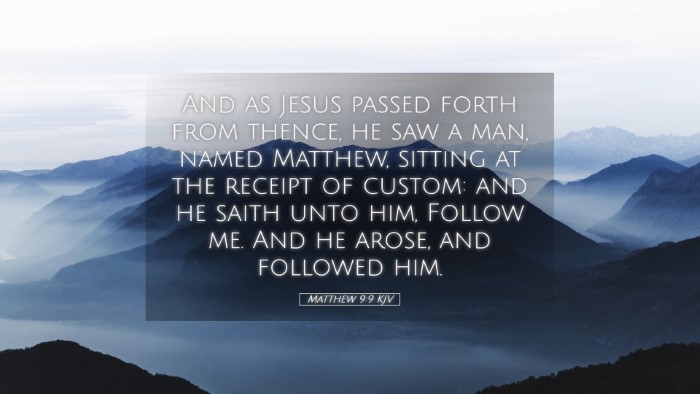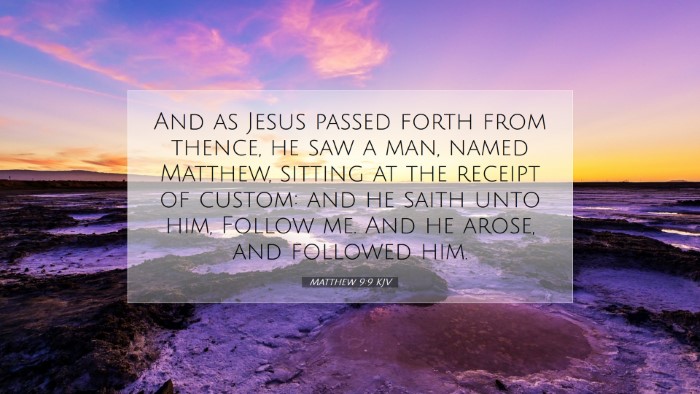Commentary on Matthew 9:9
Verse Context: Matthew 9:9 reads, "As Jesus passed on from there, he saw a man called Matthew sitting at the tax booth, and he said to him, 'Follow me.' And he rose and followed him."
Historical and Cultural Background
In the time of Jesus, tax collectors were often despised by the Jewish society. They were seen as traitors, collaborating with the Roman authorities. Matthew, also known as Levi, was not just any tax collector, but one that would have been involved in a profession marked by dishonesty and greed.
This calling of Matthew signifies the extensive grace and mercy of Jesus toward sinners. It reflects the transformative power of Christ’s call and the invitation extended to all, regardless of their past.
Commentary Insights
Matthew Henry's Commentary
Henry emphasizes the surprising nature of Jesus’ call to Matthew. He notes that this act demonstrates the inclusiveness of Jesus’ ministry. Jesus does not seek the righteous but calls sinners to repentance. Matthew, in his role as a tax collector, represents those whom society has marginalized.
Henry remarks on the immediate obedience of Matthew, which stands as a testament to the compelling nature of Jesus’ command. The act of leaving everything behind to follow Christ signifies a radical transformation and a commitment to a new way of life.
Albert Barnes' Commentary
Barnes highlights the significance of Matthew’s profession and how it positioned him as an example of God’s mercy. He interprets the act of Matthew rising and following Jesus as an emblem of true discipleship, where the call of Jesus supersedes worldly occupations and entanglements.
Furthermore, Barnes discusses the implications this has for believers today, suggesting that Christians are called to leave behind their past sins and pursue a life of obedience and discipleship, following Jesus unreservedly.
Adam Clarke's Commentary
Clarke offers a detailed analysis of the relationship between Jesus and Matthew, stating that their meeting was divinely appointed. He reflects on the nature of Matthew’s immediate response, suggesting it serves as a model for all followers of Christ, indicating a willingness to step out in faith.
Clarke also comments on the transformative journey that follows after such a call. Following Jesus is not an end in itself but the beginning of a profoundly deeper relationship of service and spiritual growth.
Theological Reflections
This passage invites profound theological reflection on the nature of God’s grace. It reveals the character of Christ as one who seeks out the lost and the marginalized, offering them a path to salvation and purpose. The act of calling Matthew also illustrates the principle of divine election and grace; it is God who initiates the relationship.
Moreover, the immediate action taken by Matthew serves as an example of the appropriate response to God’s call. It challenges believers to reflect on their priorities and the lengths they are willing to go in response to Jesus, who invites them into discipleship.
Application for Today
For pastors, students, theologians, and Bible scholars, the story of Matthew serves as a powerful reminder of Christ's ability to transform lives, regardless of background or past. This passage challenges individuals to assess their own responses to God's calling.
It also opens the discussion on inclusivity within the church, reminding believers of the imperative to reach out to those who may feel unworthy or marginalized. Every follower of Christ is invited to partake in this mission, reflecting the heart of Jesus in their interactions with others.
- Encouragement to Respond: Just as Matthew responded without hesitation, believers are urged to diligently seek God's will in their lives.
- Recognition of Grace: Acknowledge the profound grace that extends to all, encouraging outreach to those considered outside the faith.
- Model of Discipleship: Matthew’s immediate action illustrates the commitment required in the disciple’s journey.
Conclusion
Matthew 9:9 encapsulates the essence of Jesus's ministry: an open invitation to all, especially those who are lost or considered outcasts. This passage serves as both a challenge and a comfort, calling for a deeper understanding of grace and a commitment to faithful discipleship.
As scholars and leaders study this verse, may they find renewed inspiration to embrace the radical love of Christ, reaching out to the marginal and lost, just as Jesus did with Matthew.


